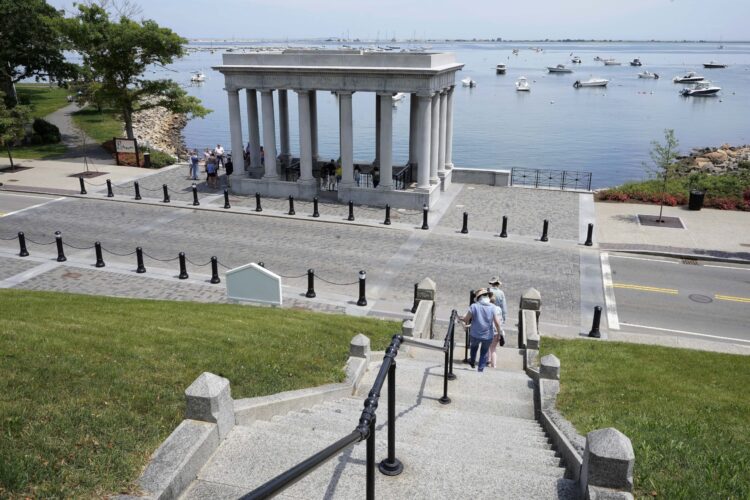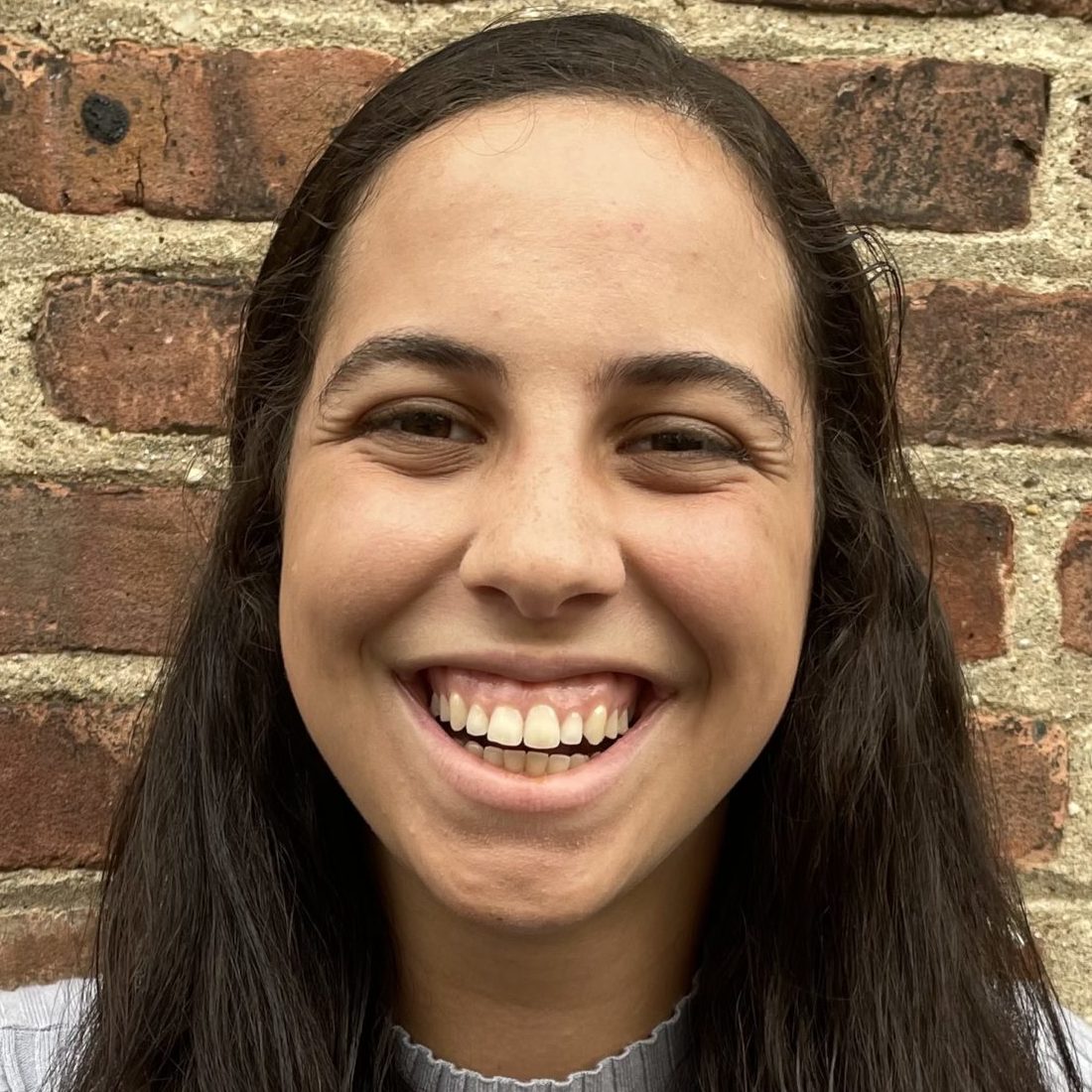
Pedestrians walk down stairs from Cole's Hill toward a pavilion that shelters Plymouth Rock, in Plymouth, Mass., June 2021
Anyone who’s spent any time in the journalism industry has heard these statistics over and over: About 2,500 newspapers have shuttered in the past two decades. One-fifth of Americans live in a news desert. Several major outlets have laid off hundreds of their staff members over the past year. The numbers are disheartening, but there’s one beacon of hope: Nearly 300 new digital local news organizations have launched since 2016, according to a report by Project Oasis.
Related Posts
The Plymouth Independent, which serves the community in Plymouth, Massachusetts, is one of those startups. Launched in November, the Plymouth Independent has hired two reporters and tapped Mark Pothier, who previously worked at the The Boston Globe as its editor and CEO.
Pothier spoke to Nieman Reports about what gaps the Plymouth Independent hopes to fill in its community, the challenges of starting up a new outlet, and more. This conversation has been edited and condensed for clarity.
How did the Plymouth Independent come to be?
It actually started before I was involved, which [was] very early this year. It was a group of people who are quite concerned about the evolution of local news across the country, and they decided to do something really substantial. Those folks include Tom Redburn, who was a longtime editor of The New York Times, and Patrick Flaherty, who is a [Plymouth] local resident who served one term on the Select Board. [He] saw that there was a lot of disconnect between town government and the general population and decided he wanted to do something about that. Then, an advisor to [the Plymouth Independent’s] board is Walter Robinson. He was a [Boston] Globe editor and known to many people as Michael Keaton in the movie “Spotlight.” There are many other board members too. We’re all Plymouth residents who are all deeply concerned about the lack of local news and what that means for not only the town but our democracy.
They approached me about serving on the board in the spring, and I wanted to do that even though I was working as an editor at The Globe because I got my start as the editor of the local paper here in Plymouth, Massachusetts, which is the Old Colony Memorial newspaper. It’s more than 200 years old, and I am personally saddened as well as concerned to see what has happened after Gannett’s ownership. It’s completely dismantled.
[The Plymouth Independent] asked me if I would be its first editor, given that my roots are here and I had my experience at The Globe that I could bring to it. The more I thought about it, the more I decided I needed to be all in on this. So I left The Globe after 22 years. It’s something that I never thought I’d be doing at this stage of my career, which is a startup. There’s really nothing except the name and some very smart, concerned people on the board. So we’ve been building it step by step, hired a couple of reporters, doing fundraising, [and] meeting with lots of people.What gaps in Plymouth’s local news landscape do you hope for the Independent to fill?
I came to realize that I no longer knew anything about what’s going on — in town politics, to schools, to construction projects, to plans for housing — because slowly over time, the local news coverage has eroded from [when] more than 80 percent of the homes in Plymouth subscribed to the newspaper. I don’t know what the numbers are now, but they must be incredibly, incredibly low. The bar is so low that anything that we’re doing is an improvement.
Our main objective is to do accountability reporting, which has not happened here in a long time and it’s not happening in many communities across the country. As a result of that, our already poor civic engagement has gotten even worse, which seems unimaginable. That’s really eroding some of the fundamentals of our democracy, and in my opinion, I think it’s dangerous. What has happened as a result of there being very little or no local news coverage is that people are turning to social media, specifically Facebook. We have a page here called All Things Plymouth that has almost 90,000 people. It’s essentially just a collection of rumors that then beget other rumors that devolves from there, sometimes into racist comments and things like that. And it’s completely beyond the control of the moderators because it’s gotten so huge. That, to me, is extremely dangerous because that is how people are getting information about what’s going on in the town.
What does the Plymouth Independent’s business model look like? How does it plan to stay sustainable?
Folks always talk to me about how excited they are that there’s going to be some legitimate news in town, and I make sure to tell them that that support and that enthusiasm has to translate into donations. Right now, we are depending largely on individual donors, and we’re asking them [for] monthly donations so that we have some kind of reliable revenue stream coming in. But the board is talking to corporate sponsors and also looking into applying for grants. There’s quite a bit of money floating out there now for nonprofits, and we hope to get a piece of that as well.
Our challenge is that we haven’t started publishing, so it’s a bit of a leap of faith to give us money before we’ve actually done anything. To me, being in journalism these days as a long-term career is a risk to begin with. I see this as something exciting and new that has more growth potential than any standard newspaper. That’s the pitch I make to younger journalists when I’m looking to hire. Right now, of course, I’m not hiring a lot of people — only two staffers to begin — but here’s your chance to get in on something on the ground toward what I believe is the wave of the future of local journalism. I do think it’s going to catch on, and I do think it will be sustainable, but it would be naive to say that we’re not facing some challenges because real journalism costs a lot of money.
What kinds of projects and initiatives do you see the Plymouth Independent taking on?
Local government accountability is huge because the town is approaching 80,000 people, it has a several-hundred-million-dollar budget, and right now, there’s really no way to know what those local boards are doing and how that money is being spent. I guess you could sit in some of the dozens and dozens of meetings that happen every week, but that’s not realistic. Our job is to try to target where we think the biggest issues are — as in most communities, it’s things like transportation, housing, diversity, education — and really, really dive into some of those issues and shed some light on them for the public. I think what’s happening is we’re going to hear from people and the story ideas are just going to come rushing in. That, in turn, I hope will spark more money from the public and sponsors and allow us to grow our staff. So accountability reporting is number one, but we also want to make the site a community gathering place that has room for culture and the arts, all of those things, and paints a really full portrait of the town.
What does success look like for the Plymouth Independent?
A larger staff within the first year will allow us to cover more things. I think success also means that we will have published some stories that will have caused change to happen and will have held people accountable for their actions in a way that will encourage the public to get involved in the community. Whether it be volunteering for boards or running for office, to really inspire people to take part in their community and not just observe from the sidelines or to just completely ignore what’s happening out of frustration. Another goal will be to have the finances to do all of that. That’s critical for free sites, so getting that money, getting enough of it, is going to be a critical measure of whether we can be sustainable long term.
How does the Plymouth Independent plan to involve the community?
I have a real deep interest in the arts in general. I know anecdotally and just from meeting people, there are a lot of artists who don’t really feel connected to a greater artists community, and I think there’s something we can do on the website. One feature we’re going to have is something called Your Art Here, and it’s really just a place where local artists can submit their work and have it displayed in a nice portfolio of local artists’ works. It’s a way for them to get exposure if they want to sell their artwork.
One of our reporters, Fred Thys, speaks Portuguese and Spanish. We have a growing Brazilian community in Plymouth, which outside of that is a mostly white community. We definitely want to reach out to those folks and tell their stories. Plymouth also likes to bill itself as “America’s Hometown,” which is something of a controversial statement. The whole issue of the Pilgrims and Indigenous people — not rewriting history, but telling a more accurate story about Plymouth history, is something I think we can be a part of. So those are things related to inclusion, culture, and a sense of community that I think we can help with.
What challenges do you see the Plymouth Independent needing to overcome?
It’s a huge change because I spent most of my career working for a big newspaper, where I had support systems around me. In this case, starting up, it was just me on the editorial side. I got up on that first day, set out my laptop, made some coffee, and sat at the table and said, “Here we go.” And that’s been both exciting and a little bit scary at times. As I’ve gone through this first month, I’ve heard from so many people in town, including people who are or were journalists, people who are photographers, they’re all residents who volunteered to help in any way they can. That’s really made me feel optimistic about what we’re going to be able to do.
I think once we start publishing, we’re going to get flooded with story ideas, and that is not surprising because there has been so little coverage. I think there’s a pent-up demand, and the challenge for us will be funneling all those story ideas into a site that is going to be able to meet the expectations that people have. [It’s] also showing the need for us to get more resources so we can do more. A big challenge for us will be in deciding what stories we’re going to cover initially. I think that will set the tone for where we’re going because we won’t be able to do everything that everyone wants. I don’t think any newspaper can, but [for a] fledgling news site, in particular, you have to be judicious about what it decides to dedicate resources to.
Is there anything else about the Plymouth Independent you want people to know?
When I did my Nieman Fellowship, which was in 2000 to 2001, my pitch when I applied was that I was really concerned about the future of community journalism. I felt that it was eroding already. Many newspapers moved from family ownership to being taken over by larger and larger companies, and that was more than 20 years ago. Now I’ve come back to Plymouth, and unfortunately, I’ve seen as time comes to pass that my concerns about community journalism were well founded, and that we’re really in a crisis situation. People interact with government most at the local level. It’s where they pay their taxes, where they live, for schools, for the services they get. When news coverage of communities erodes, it leaves this vacuum that’s filled by rumor and innuendo. I think that is how democracy could erode and be put in peril in America, unless we shore up more journalism at this level.
I’m heartened by the fact that so many new sites like ours are popping up all over the country. We do have a long way to go. The forces of social media are great and threatening on so many levels. That’s really why I’m doing this. I could have just stayed at the Globe — I always wanted to work at the Boston Globe, and I had a really fulfilling career, but this felt urgent and important. If I can help get this off the ground and help to make it sustainable, I feel good about that.
A previous version of this article stated that the Plymouth Independent had a several million dollar budget; it is actually several hundred million. The article has been updated to reflect this change.



